Epic Games vs Apple -- The continuing App Store saga
Between Epic CEO Tim Sweeney's ongoing complaints, the trial, and Apple's lies, the Epic vs. Apple App Store lawsuit continues to roll on years later. Here's all you need to know about the long-running courtroom drama, updated on May 8, 2025.
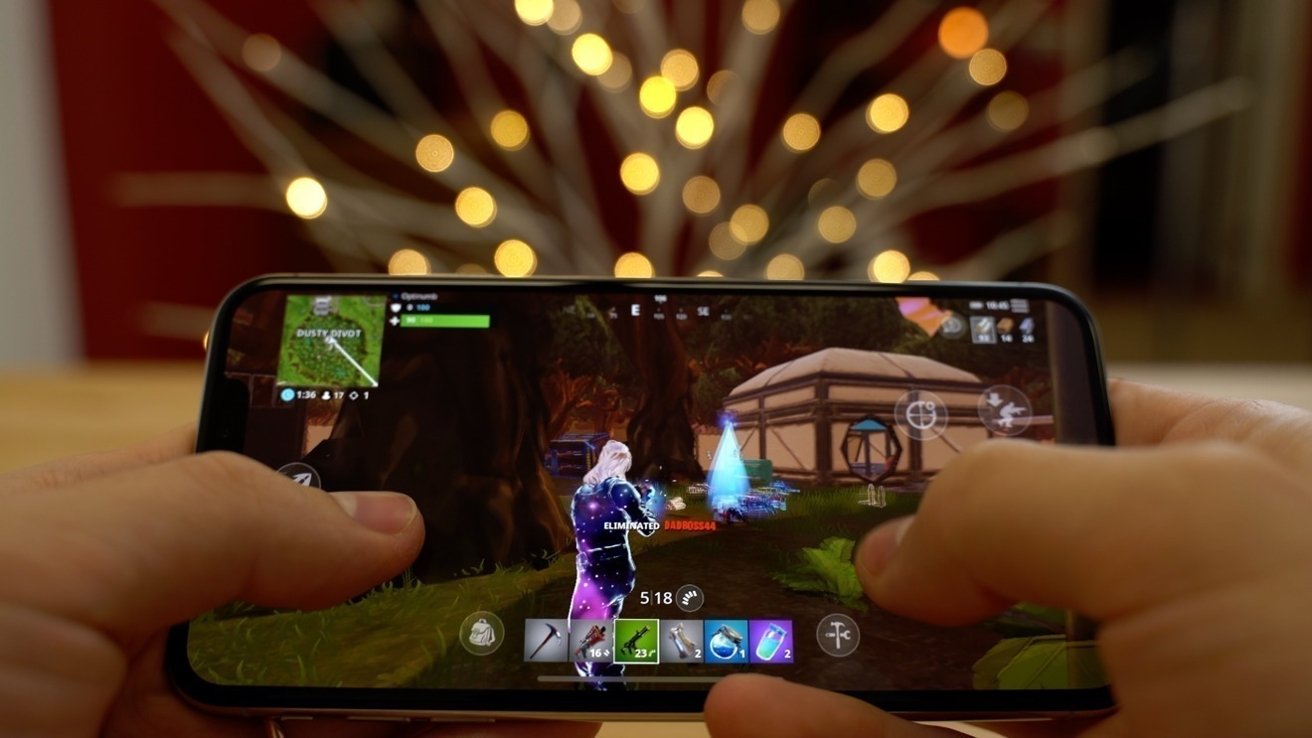
Within the space of a few weeks in 2020, a disagreement between the ambitions of Epic Games and the intention to maintain the App Store status quo by Apple courted considerable controversy. The affair commenced with little warning to consumers but quickly led to international interest as the battle sought to change one of the fundamental elements of the App Store: how much Apple earns.
Apple's dominance has previously led to an antitrust probe by the U.S. Justice Department into the App Store's fees and policies. Still, the disagreement between Apple and Epic was being made more public and directly affected younger customers.
While the fight was mostly Epic vs. Apple, it saw other parties wading in with their observations and opinions, including developers of different apps in the App Store. Simultaneously, as Apple received scrutiny over its policies, Epic itself also came under fire for how it handled the situation, including forcing it to happen and orchestrating what was revealed to be a premeditated response.
With the Supreme Court seemingly ending the dispute by declining to hear appeals from either side in 2024, that hasn't stopped the battle completely.
Here's how Apple and Epic got into a years-long litigious battle, what followed after the ruling, the appeals over the original trial's ruling, that result, and everything that came after.
Epic vs. Apple - Epic updates "Fortnite", Apple pulls it down
The main triggering event occurred on August 13, when Epic updated the Fortnite app with a new feature, one that allowed consumers to pay Epic directly for in-app currency at a discount, rather than paying traditionally via Apple's App Store payment mechanism. Offering the option enabled Epic to skirt App Store rules that demanded payments go through the App Store payment system, paying a 30% fee.
The fee is a non-negotiable element for most apps, but some exceptions exist. The rule pertains to digital goods, with exceptions made for physical goods, such as online retailers and restaurants. At the same time, subscriptions can pay a smaller cut of the transaction fee in many situations.
The change was not limited to just the iOS version of the game, as it was similarly applied to the Android version, again going against the Google Play Store's similar policy and fees.
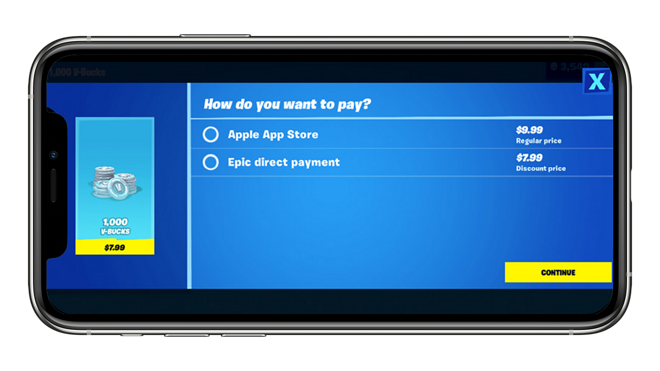
The "Fortnite" update added a second direct payment option.
As was to be expected, Apple pulled the game from the App Store for violating the App Store guidelines within hours of the update's appearance. Similarly, Google also pulled the game from the Google Play Store, though on Android, the game remained available via third-party stores, at least at first, and from Epic directly.
Epic vs. Apple - Lawsuit and Marketing
The same day as the removal, Epic filed a lawsuit against Apple in the U.S. District Court for the Northern District of California, in retaliation for pulling the game. It laid another lawsuit against Google for its Fortnite removal.
The complaint from Epic took an accusatory stance, declaring Apple had become a "behemoth seeking to control markets, block competition, and stifle innovation. The suit also went as far as to allege Apple's size and reach "far exceeds that of any technology monopolist in history."
An important part of the suit was that it didn't attempt to argue whether Epic was abiding by App Store guidelines but instead fought against them. Its objections to the policies primarily included Apple's "exorbitant" 30% commission for in-app purchases.
It also argued that the same policies are anti-competitive because they force developers to use the App Store. If the rules weren't there, Epic stated, it would have released its competing app store.
Epic's argument disregarded the fact that Apple's App Store and ecosystem are relatively similar to those of Sony's Playstation and Microsoft's Xbox platforms. Each requires the use of a single digital storefront, specific payment systems, and a 30% cut of transactions.
At this time, Epic has yet to file lawsuits against either Sony or Microsoft, demanding transaction fee cuts or the ability to operate its digital marketplace.
The filing sought an injunction prohibiting "Apple's anti-competitive conduct" and any "equitable relief necessary."
At the same time as it filed the lawsuit, Epic Games attempted to raise support in the court of public opinion by releasing a video parody of Apple's famous "1984" Super Bowl commercial. In this version, a Fortnite character smashes a screen displaying a cartoon talking apple, complete with a worm.
While the original framed Apple as the breaker of the aging oppressive IBM's grasp on computing, the parody had Apple in IBM's place, with Epic as the breaker of Apple's App Store control.
As of the end of the dispute in January 2024, people had viewed the video 8.5 million times. Epic was also attempting to get the social media hashtag #FreeFortnite trending.
The timing of the lengthy lawsuit and the sudden marketing blitz within a few hours of Apple's takedown of the game strongly suggested at the time Epic had prepared them beforehand, anticipating the app's removal.
Epic vs. Apple - Developer account threat
On August 17, 2020, Apple made an offensive move against Epic, which was revealed to the public by Epic over Twitter. Epic alleged that Apple had informed Epic it would be terminating all developer accounts and cutting Epic off from iOS and Mac development tools on August 28.
Epic requested a temporary restraining order to prevent Apple from taking "any adverse action against it." The filing also included a request for the court to prevent Apple from "removing, de-listing, refusing to list or otherwise making unavailable the app Fortnite, including any update thereof, from the App Store on the basis that Fortnite offers in-app payment processing through means other than Apple's IAP or on any pretextual basis."
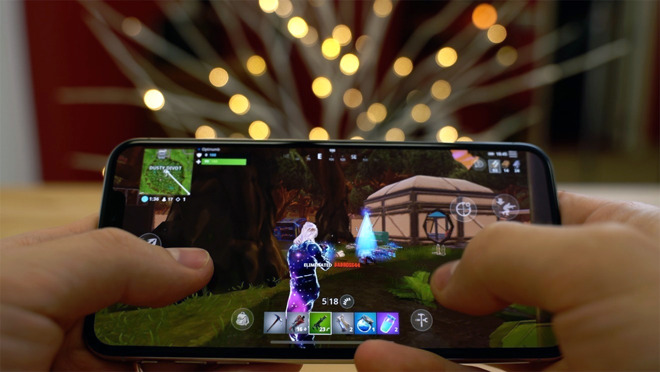
Playing "Fortnite" on an iPhone
Epic's court filing included the letter Apple sent to the company, which noted "several violations of the Apple Developer Program License Agreement" by Epic and stated that access would be terminated unless the violations were dealt with within 14 days.
To Epic, the removal of developer tools extended far beyond Fortnite, as the company provides the Unreal Engine to thousands of developers for use in their games. By not using developer tools to maintain the macOS and iOS elements of the game engine, it effectively cannot provide support to third-party developers who licensed the technology.
The lawsuit declared, "Apple is attacking Epic's entire business in unrelated areas."
Epic vs. Apple - Sweeney before and after the takedown
Epic Games CEO Tim Sweeney has been a public critic of the App Store and its fee structure. In an interview in July, Sweeney outlined his insistence that Apple and Google stunt innovation with their respective app store policies.
In the case of Apple, Sweeney called the App Store an "absolute monopoly," and that Apple "has locked down and crippled the ecosystem by inventing an absolute monopoly on the distribution of software, on the monetization of software." At the time, Sweeney added that if developers could take their payments instead of paying the "30% tax," the savings could be passed on "to all our consumers and players would get a better deal on items, and you'd have economic competition."
Sweeney has railed against the transaction fee for quite some time, with comments from 2017 declaring the models "pretty unfair" and that companies like Apple are "pocketing a huge amount of profit from your order - and they aren't really doing much to help [developers] anymore."

Epic Games CEO Tim Sweeney
Epic also operates its app store on PC as a competitor to Steam and others. While it is beneficial to developers to take a smaller 12% cut from transactions, the company has also performed activities some may deem as anti-competitive, including paying developers for exclusive game launches that are available only through its storefront and not rivals. Epic partnered with Facebook for a timed exclusive on one of its VR games, "Robo Recall," on the original Oculus Rift.
In a June 2020 interview, Sweeney also suggested an Epic Games Store could arrive on mobile platforms in the near future, including an iOS version.
"We think it's a good way to help the industry forward and it's another way where Epic as a game developer had built up this audience around Fortnite and learned how to operate a distribution platform on P.C. and Android," said Sweeney.
On August 15, 2020, after the takedown and initial legal action, Sweeney then made the case for the lawsuit in a series of tweets.
Characterizing it as being more for consumer and developer choice than more lucrative financial deals, Sweeney suggested it was a fight for the "freedom of people who bought smartphones to install apps from sources of their choosing, the freedom for creators of apps to distribute them as they choose, and the freedom of both groups to do business directly."
Sweeney also acknowledged the argument that some may see the fight as "just a billion-dollar company fighting a trillion-dollar company about money" before admitting, "there's nothing wrong with fighting about money."
He qualifies it by declaring, "You work hard to earn this stuff. When you spent [sic] it, the way it's divided determines whether your money funds the creation of games or is taken by middlemen who use their power to separate gamers from game creators."
"The fight isn't over Epic wanting a special deal, it's about the basic freedoms of all consumers and developers," Sweeney proposed.
It is worth remembering that Sweeney's position may not necessarily be entirely altruistic. Fortnite is an extremely high earner for Epic, including through in-app purchases on iOS, and has been ever since it first appeared on the App Store in 2018.
As for Epic, Chinese tech giant Tencent has a 40% stake in the company. Tencent has been in disagreements with Apple in the past regarding payment processing, with a 2018 spat involving WeChat money transfers between individuals outside of Apple's payment systems resolved with a "mutual understanding."
Epic vs. Apple Courting allies
To try and strengthen its position in the Epic vs. Apple fight, Epic reportedly sought to find other companies with a similar opinion of the App Store. Epic allegedly contacted other companies in weeks to try and create a so-called "coalition" of Apple critics.
The list of companies supposedly included Spotify, who did come out in support of Epic's legal action shortly after it was filed. Spotify is already engaging Apple via an antitrust complaint since 2019.
It is unclear if a coalition exists and what its specific purpose is. However, Epic received multiple criticisms of Apple from various corners of the tech industry.
Epic vs. Apple - Newspaper pushback
On August 20, 2020, a group of major newspaper publishers contacted Tim Cook to urge a change to subscription fees, spurred on by the Epic fight. The current policy has the App Store commission fee set at 30% for the first year's subscription to a publication via an app, but for subsequent years it reduces down to 15%.
The group of publications, including the Wall Street Journal, the New York Times, and the Washington Post, instead wanted the 30% charge removed in favor of a reduction down to 15%.
As part of the letter written by trade body Digital Content Next, the group referred to a deal Apple made with Amazon in 2016 that would take a 15% cut of transactions for customers signing up for a Prime Video subscription as an in-app purchase. The letter asked that Apple "clearly define the conditions that Amazon satisfied for its arrangements so that DCN's member companies meeting those conditions can be offered the same agreement."
Epic vs. Apple - Korean investigation demands
Meanwhile, in Korea, a group of companies petitioned the Korean Communications Commission, claiming Apple and Google's in-app purchase rules are illegal. The Korea Startup Forum group objected to how much Apple and Google charge and the lack of alternative payment options.
"While the 30 percent commission rate is too high in itself, it is more problematic that they force a specific payment system for the app markets," said the consortium. Furthermore, this is said to be more unfair to smaller companies that cannot negotiate different commission rates with the app storefronts.
It also suggested that both Apple and Google could raise their fees without consultation, potentially reducing developers' profits or making apps more expensive to consumers.
Epic vs. Apple - Apple's first statement
Apple's initial public salvo in the battle on August 18 was a relatively straightforward affair, consisting of a plainly-written statement that accuses Epic of being in the wrong, by not rectifying "the problem Epic has created for itself."
The statement started with Apple assuring the reader that the App Store is "designed to be a safe and trusted place for users and a great business opportunity for all developers."
Apple then mentioned how Epic is "one of the most successful developers on the App Store, growing into a multibillion-dollar business that reaches millions of iOS customers" and that Apple wanted to keep Epic in the Apple Developer Program and offer apps in the App Store.
"The problem Epic has created for itself is one that can easily be remedied if they submit an update of their app that reverts it to comply with the guidelines they agreed to and which apply to all developers," reminded Apple.
The statement concluded, "We won't make an exception for Epic because we don't think it's right to put their business interests ahead of the guidelines that protect our customers."
More public marketing
In a further bid to capitalize on the anti-Apple sentiment of part of its player base, Epic launched the "FreeFortnite Cup" tournament"FreeFortnite Cup" tournament that started from August 23, 2020. The game offers a selection of prizes, including digital items such as the "Tart Tycoon" skin resembling the Apple character from the parody ad.
Epic also offered physical Prizes, though again with a decidedly anti-Apple leaning. Approximately 20,000 "Free Fortnite" hats were given away in a design reminiscent of Apple's "Think Different" merchandise. At the same time, 1,200 other prizes included consoles and computers, which platforms players can play Fortnite on without going down the Apple route.
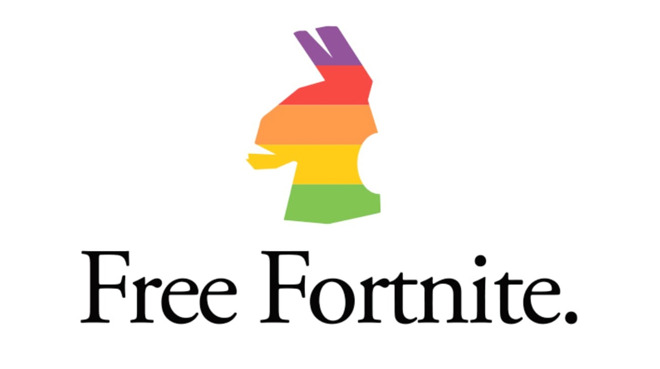
Epic's giveaways included clothing parodying Apple's marketing.
Epic has also made its "Free Fortnite" graphic available to players to print onto their clothing and other items in the event they didn't win. The asset pack did, however, require users to confirm they will leave the text "Free Fortnite" in place on the graphic when used and not edit it out to leave the rainbow-colored llama head.
Epic vs. Apple - Email chains and Apple's filing
Apple's first legal response to the Epic vs. Apple lawsuit on August 21, 2020, was lengthy and interesting for many reasons. It chiefly urged the U.S. federal court in San Francisco to deny Epic's claims for an "emergency" restraining order that would put Fortnite back in the App Store.
At its core, Apple compared Epic's behavior of adding its proprietary payment system, which allowed it to bypass the 30% fee, to that of a shoplifter. "If developers can avoid the digital checkout, it is the same as if a customer leaves an Apple retail store without paying for a shoplifted product: Apple does not get paid," the filing states.
The complaint went on to state Sweeney contacted Apple's executives asking for a "side letter" from Apple that it would create a "special deal for only Epic that would fundamentally change the way in which Epic offers apps on Apple's iOS platform," said Apple App Store chief Phil Schiller.
Specifically, Epic said it wanted to bypass App Store fees by gaining permission to implement direct payment systems. When denied, Sweeney informed Apple that Fortnite "will no longer adhere to Apple's payment processing restrictions."
The filing, which included a selection of emails between Apple and Epic, refutes Sweeney's earlier claim of not wanting a "special deal," as he is seemingly shown to be asking for one.
The email chain started with a June 30 message from Sweeney to Tim Cook, Phil Schiller, Craig Federighi, and Matt Fischer outlining Epic's intention to use a competing payment processing option. The email also states a wish to create "a competing Epic Games Store app available through the iOS App Store and through direct installation that has equal access to underlying operating system features for software installation and update as the iOS App Store itself has, including the ability to install and update software as seamlessly as the iOS App Store experience."
Epic gave Apple two weeks to confirm "in principle" to permit the competing app store and payment processing. "If we do not receive your confirmation, we will understand that Apple is not willing to make the changes necessary to allow us to provide Android [sic] customers with the option of choosing their app store and payment processing system," Sweeney's message concluded.
On July 10, Apple Vice President & Associate General Counsel Douglas G. Vetter contacted Epic's general counsel Canon Pence about the "disappointing" email, with a lengthy message outlining why Epic was wrong on this occasion. Vetter pointed out that Epic has greatly succeeded with the App Store, including "hundreds of millions of dollars from sales of in-app content." Vetter outlined, "Epic could not have achieved this success without great apps, but it nonetheless underscores the value Apple brings to developers like Epic."
Vetter argued against creating an Epic Store app by pointing to consumers' security and trust in the App Store, including Apple's investment in significant resources to ensure app "privacy, security, content, and quality" standards. Apple doesn't allow other app stores to be offered as Apple would have "no reliable way" to maintain its commitments to consumers over the four areas, and consumers would "hold Apple to account for any shortfall in performance."
Despite assurances the Epic Store would offer protections on device security and consumer privacy, Apple "cannot be confident that Epic or any developer would uphold the same rigorous standards of privacy, security, and content as Apple."
Referring to a tweet from Sweeney on June 16, 2020, about how it is "up to the creator of a thing to decide whether and how to sell their creation," Apple agreed with the sentiment. "It seems, however, that Epic wishes to make an exception for Apple and dictate the way that Apple designs its products, uses its property, and serves its customers."
One week later, Sweeney acknowledged the clear answer to Epic's requests while also taking a swipe at the decision for the response to be handed over to Apple's legal team to create "such a self-righteous and self-serving screed."
Almost a month later, on August 13, Sweeney again emailed Apple's executive team and Vetter, advising Epic that it would "no longer adhere to Apple's payment processing restrictions" by introducing direct payments in the Fortnite app.
"We choose to follow this path in the firm belief that history and law are on our side," wrote Sweeney. "smartphones are essential computing devices that people use to live their lives and conduct their business. Apple's position that its manufacture of a device gives it free rein to control, restrict, and tax commerce by consumers and creative expression by developers is repugnant to the principles of a free society."
Sweeney signed off by claiming Epic would "regrettably, be in conflict with Apple on a multitude of fronts - creative, technical, business, and legal" if Apple took "punitive action" by blocking the app or future updates.
Apple's last two emails in the chain are from Apple. One explained how the Fortnite app violated the App Store Review Guidelines in multiple ways. At the same time, the other advises terminating Epic's access to the Apple Developer Program, again for several violations.
Epic vs. Apple - Epic counter-argues and Microsoft agrees
On August 23, 2020, Epic filed a rebuttal to Apple's court filing, attempting to poke holes in Apple's arguments against Epic's injunction motion the day before it took place.
Epic's reasoning included calling Apple's argument Epic's requested relief to prevent the revocation of tools as "mandatory rather than prohibitory" as incorrect. Epic stated it wanted to "preserve the status quo."
On how Apple believes contracts authorize revocation, Epic says this is wrong, as Apple "fails to acknowledge the multiple contracts between Apple and Epic affiliates and programmers," namely licensees.
Arguments about how the "balance of equities tips" in Apple's favor and the motion's harm to "the public interest" were both dismissed by Epic as they don't include actual claims that apply to revoking access to developer tools to work on Unreal Engine.
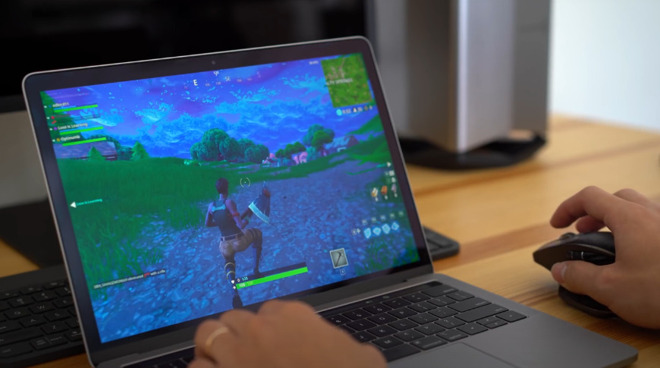
Fortnite played on a MacBook Pro
For Apple's claim, Epic hadn't provided evidence that its Unreal Engine business would be "significantly harmed." Epic refers to multiple declarations included with the original motion and other elements surfacing since the filing.
This includes a declaration from Microsoft confirming it has an "enterprise-wide, multi-year Unreal Engine license agreement" and that it has put significant resources into customizing the engine for its products, including iOS devices.
"Denying Epic access to Apple's SDK and other development tools will prevent Epic from supporting Unreal Engine on iOS and macOS, and will place Unreal Engine and those game creators that have built, are building, and may build games on it at a substantial disadvantage," writes Microsoft.
Epic also goes as far as to declare that "the breadth of Apple's retaliation is itself an unlawful effort to maintain its monopoly and chill any action by others who might dare oppose Apple" in the filing.
Even-score hearing
On August 24, 2020, the companies met with U.S. District Court Judge Yvonne Gonzalez Rogers for the first legal hearing of the Epic vs Apple affair.
In the ruling, Epic was found to be unable to demonstrate irreparable harm from Apple's ban of Fortnite, and that it was a situation of Epic's own making. Epic's arguments failed to outweigh "the general public interest in requiring private parties to adhere to their contractual agreements or in resolving business disputes through normal, albeit expedited, proceedings."
Apple argued that Epic's integration of direct payments was intentionally made to kick off the legal scrum, which Epic's lawyers later admitted was true, as it was necessary to force Apple's hand.
While Fortnite is off the App Store and would remain so for the immediate future, Apple was ordered to not take action against Epic Games International's developer account. The SARL entity is responsible for licensing Epic's Unreal Engine, and a ban on that account's access would restrict updates to the engine and would hurt developers licensing the software by extension.
"Apple has chosen to act severely, and by doing so, has impacted non-parties, and a third-party developer ecosystem," wrote Rogers. "In this regard, the equities do weigh against Apple."
"Epic Games and Apple are at liberty to litigate against each other, but their dispute should not create havoc to bystanders. Certainly, during the period of a temporary restraining order, the status quo in this regard should be maintained," the motion states.
Apple applauds court
Following the California court ruling, Apple stated AppleInsider and other venues applauded the decision.
"We thank the court for recognizing that Epic's problem is entirely self-inflicted and is in their power to resolve. Our very first priority is making sure App Store users have a great experience in a safe and trusted environment, including iPhone users who play 'Fortnite' and who are looking forward to the game's next season," Apple said.
"We agree with Judge Gonzalez-Rogers that 'the sensible way to proceed' is for Epic to comply with the App Store guidelines and continue to operate while the case proceeds. If Epic takes the steps the judge has recommended, we will gladly welcome 'Fortnite' back onto iOS. We look forward to making our case to the court in September."
A hearing on a motion for a preliminary injunction against Apple was scheduled for late September 2020.
Epic says it won't make changes
On August 26, 2020, Epic Games told players of Fortnite not to expect updates to the app, as Apple was "blocking" updates and new installations via the App Store. While true, the statement avoided mentioning how the situation arose after Epic baited Apple.
The season update on August 27 would be available on all other platforms the game can be played on, but not iPhone, iPad, or Mac.
Epic vs. Apple - German antitrust interest
On September 2, 2020, it was reported Germany's Federal Cartel Office was keeping a close eye on the Epic vs. Apple legal wrangling, with a view to potentially launch an antitrust probe.
"This has most certainly attracted our interest," said office chief Andreas Mundt. "We are at the beginning, but we are looking at this very closely." Mundt pointed out that the App Store and the Google Play Store represent "an interesting habitat, because they are the only two worldwide."
Though the Federal Cartel Office can impose fines, it was more likely that officials would try to force changes in the ways the app stores functioned instead.
"Incalculable harm to users"
Epic made a second attempt to convince the court to force Apple into keeping Fortnite available to download on September 5, 2020. While the initial effort was an emergency measure by the company, the new version was a more formal petition to the court.
After being accused of violating antitrust for misusing its power, Apple "used that same power to try and coerce Epic to abide by its unlawful restrictions," Epic submitted. It followed up by suggesting Apple's actions will "cause irreparable harm to Epic, as well as harm to countless third parties and the public interest."
This included the Fortnite community, in that removing the game from the App Store "cleaved millions of users from their friends and family" and prompted a "deafening" user outcry. As of the filing, Epic claimed it had seen a 60% decline in daily active users on iOS.
Epic also reasoned that the "balance of harms tips strongly in Epic's favor, in that it stood to lose considerably more than Apple, which would "at most lose some commissions from Epic."
The filings included numerous declarations from key Epic staff, communications between the two companies, a document from a co-executive director of the Jevons Institute for Competition Law and Economics at University College London about Apple's antitrust issues, and a selection of consumer emails.
Apple fires back at Epic, seeks damages for breach of contract
In a counterclaim on September 8, 2020, Apple called the Epic Games lawsuit "nothing more than a basic disagreement over money." The Cupertino tech giant added, "although Epic portrays itself as a modern corporate Robin Hood, in reality it is a multi-billion dollar enterprise that simply wants to pay nothing for the tremendous value it derives from the App Store."
Apple reiterated that Epic fired the first volley in the legal saga with its direct payment system in Fortnite. The counterclaim, filed in the U.S. District Court for the Northern District of California, calls Epic Games' behavior "willful, brazen, and unlawful," adding that Epic has made over $600 million from the App Store.
Additionally, Apple alleged that Epic's implementation of a direct payment system bypassing its App Store commissions was a "sneak assault" on the app marketplace.
The filing asked the court to hold Epic liable for breach of contract and seeks restitution of the revenue that Fortnite made through its direct payment system. It also requested a permanent injunction banning the direct payment system across all of Epic's apps on the App Store.
Goodbye "Sign in with Apple" -- or not
On September 9, 2020, Epic Games told consumers Apple "will no longer allow users" to authenticate using Sign in with Apple for Epic Games accounts as soon as September 11, warning consumers to update their accounts to move away from it.
The following day, Epic advised Apple to provide an "indefinite extension" to Epic Games' access to Sign in with Apple. However, it is still recommended that users update their accounts anyway.
In a statement, Apple said it wasn't actively seeking to disable compatibility with Sign in with Apple.
Sweeney Twitter Thread
On September 9, 2020, Epic Games CEO Tim Sweeney wrote about how Apple was missing the bigger point of Epic's actions. The thread, which suggested Apple oversimplifies Epic's actions in its countersuit, attempts to sway the court of public opinion.
Sweeney claims Apple has overextended its reach over consumer devices, stating that all users should be able to install software freely and developers should be able to create and share apps as they wish.
This is EXACTLY what Apple's 1984 commercial was all about. Making computing personal, overcoming the awful precedent of IBM mainframes where computer owners were reduced to essentially just leasing devices controlled by an all-powerful company.
-- Tim Sweeney (@TimSweeneyEpic)
After poking at Apple's famous 1984 commercial and insinuating the current situation is "exactly what" the ad spot was about, he goes on to say Epic's parody was striking back against an unfair system. Apple allegedly erodes the rights of consumers and developers by being an intermediary to "exert control and extract money."
App Store guidelines massaged for gaming services
On September 11, 2020, Apple adjusted some of its App Store guidelines to make it possible for online game streaming services to exist on iOS, such as Microsoft Xcloud and Google Stadia. Though not directly connected to the Apple and Epic fight, they cover similar territory.
Apple doesn't allow an Apple Store within the App Store, as Epic wanted to implement, but it does allow games on such streaming services to be submitted to the App Store as individual apps with their product page, appearance in charts, and compliance with other App Store rules.
The "catalog app" must also comply, including providing an option for users to "pay for the subscription with an in-app purchase" and use Sign in with Apple, as well as linking to games on the service by pointing users to App Store listings instead of its own website.
Crucially, the rules still allow a service to enable off-app purchase confirmations, allowing access to content without using Apple's payment mechanisms. However, that must be done completely outside the app, not how Epic implemented it as a separate in-app payment option.
Apple says Epic using dispute as "Fortnite" marketing tool
In a filing on September 16, 2020, Apple accused Epic of using the whole App Store Fortnite dispute as promotion for the game, which Apple thought was declining in popularity on iOS.
"For reasons having nothing to do with Epic's claims against Apple, Fortnite's popularity is on the wane," said Apple's filing. "By July 2020, interest in Fortnite had decreased by nearly 70% as compared to October 4 2019. This lawsuit (and the front-page headlines it has generated) appears to be part of a marketing campaign designed to reinvigorate interest in Fortnite."
Apple also denied that Epic had suffered its claimed reputational harm, suggesting "Epic has engaged in a full-scale, pre-planned media blitz surrounding its decision to breach its agreement with Apple, creating ad campaigns around the effort that continue to this day."
"If Epic were truly concerned that it would suffer reputational injury from this dispute, it would not be engaging in these elaborate efforts to publicize it," it continued. "From all appearances (including the #freefortnite campaign), Epic thinks its conduct here will engender goodwill, boost its reputation, and drive users to Fortnite, not the opposite. That is not harm."
Epic denies marketing exercise
In a rebuttal, Epic countered Apple's claims, saying that it had "cherry-picked" the data. Apple's 70% claim was sourced from Google Trends data for search volumes, which started with a spike in interest caused by a popular in-game event.
Epic insisted it saw increased daily user figures over the same ten-month period of "more than 39%."
The filing fired back by refuting Apple's claim that "it is no monopolist" due to a comparison in which smartphones were "interchangeable" with computers and gaming consoles for the comparison of digital stores. Epic declared, "That assertion is contrary to basic antitrust principles and common sense: a Sony PlayStation does not fit in your pocket but a smartphone does."
The Coalition for App Fairness
On September 29, 2020, the Coalition for App Fairness was formed by several big-name app developers. The non-profit aims to highlight issues developers face when developing for the App Store.

The developers include Epic Games, Spotify, and Tile, among its founding members, as well as Deezer, Match, News Media Europe, and ProtonMail.
The creation of the group came at a sensitive time for Apple, which was also under multiple antitrust investigations over its App Store dealings.
It published a list of ten principles that app stores should follow. These principles include many gripes mentioned previously by Apple's critics. They include decentralizing app hosting, preventing self-preferential practices, and lowering Apple's commission cuts.
Epic vs. Apple - The Next Hearings
During a lengthy and animated hearing on September 28, 2020 , Apple and Epic took turns trying to argue their case to Judge Yvonne Gonzalez Rogers. Epic was seeking reinstatement of the Fortnite app in the App Store and for accounts linked to the Unreal Engine to be protected from any further harm from Apple.
Judge Rogers was seemingly unconvinced by Epic's arguments throughout the two-hour hearing. Among the issues was Rogers highlighting it was a matter of Epic's own doing during times when Epic's lawyers were urging Apple's actions against it suffered harm and that Epic had forced Apple's hand in the matter.
Rogers also rebuffed Epic's repeated claims that Apple was a monopolist and admonished Epic for not being "forthright" with Apple itself. The judge even took time to call out Epic's odd argument that Apple couldn't compare a smartphone to a game console due to its size and portability, which Rogers countered by referencing that the Nintendo Switch exists in such a form.
The judge made the suggestion the trial should be held in front of a jury, as it is a matter that is "important cases on the frontier of antitrust law." Rogers also proposed that the opinions of a federal judge may not be as useful as those of the general public since "it is important enough to understand what real people think."
Rogers set a deadline of January 6, 2021, for the filing of data for the trial, but the trial itself would take place sometime in July 2021, on a date to be determined.

Another still from Epic's parody of Apple's '1984' Super Bowl commercial
Hearing without a jury
On September 30, 2020, both Apple and Epic filed with the court that, after conferring, the court itself should make the decision and not the public.
Apple had originally pushed for a jury trial but withdrew its request to streamline proceedings. Mentioning Judge Roger's admittance in a preliminary hearing that she didn't want to "try two cases" and was "inclined to try both cases at once," Apple said it was willing to forego a jury trial to get the ball rolling.
"Fortnite" stays out of App Store
On October 9, 2020, an Epic vs Apple ruling from Judge Rogers was published, with results mixed for both Apple and Epic. While Epic was able to protect the Unreal Engine-linked developer accounts, a request was denied to force Apple to reinstate Fortnite to the App Store.
"While consumers are feeling the impact of this litigation, the fact remains: these are business disputes," said Rogers in the ruling about Fortnite. "A punitive class action on behalf of all developers on these exact same issues was already in progress when Epic Games breached the agreements. Yet, Epic Games has never adequately explained its rush, other than its disdain for the situation. The current predicament is of its own making."
For the Unreal Engine, Rogers felt that removing account access would harm developers. "Apple's aggressive targeting of separate contracts in an attempt to eradicate Epic Games and its affiliates from the iOS platform was unnecessary and imperiled a thriving third-party developer ecosystem," wrote the Judge.
In a statement to AppleInsider, Apple expressed gratefulness on the court as it "recognized that Epic's actions were not in the best interests of its own customers and that any problems they may have encountered were of their own making when they breached their agreement."
Lack of discovery
A joint filing on October 13, 2020, ahead of a case management conference scheduled for October 19, had Apple and Epic complaining about how the other party is handling the discovery portion of the lawsuits. Both claim the other is being uncooperative in different ways.
Epic accused Apple of failing to provide all of the needed documentation. Apple's list of custodians used to collate and supply relevant documents reportedly excluded co-founder and late CEO Steve Jobs and current CEO Tim Cook.
During its earlier motion hearings, Epic also said Apple "repeatedly relied" on the two men. Still, Apple countered by pointing out they were referred to twice, namely Tim Cook's statement to the U.S. House of Representatives Judiciary Committee and "an AppleInsider article quoting Steve Jobs."
Apple said it had provided Epic with "the 3.6 million documents" produced by Apple during its developer class action and consumer class action suits. However, Epic believed they could have been provided sooner.
Epic claimed it has made "an initial production of more than 16,000 pages from the files of Timothy Sweeney," Epic's CEO. Still, Apple believes Epic may have "cherry-picked" the documents that may "omit a significant amount of relevant materials."
Apple also claimed Epic received a third-party discovery request before it formed its lawsuit against Apple, to which Epic allegedly told Apple to "just wait a bit," then filed the lawsuit before responding to the subpoena.
Epic denies theft
On October 23, 2020, Epic made another filing to the court, arguing its actions are a "far cry from the tortious -- even purportedly criminal -- conduct that Apple's Opposition depicts." This is in reference to Apple's claim that "Epic's flagrant disregard for its contractual commitments and other misconduct has caused significant harm to Apple."
"Simply put, Epic did not 'steal' anything that belonged to Apple. Epic could not and did not 'steal' the proceeds from the sales of its own creative efforts. Nor did Epic interfere with any prospective economic advantage Apple sought to gain from 'Fortnite' users separate and apart from their interest in 'Fortnite," the filing claimed.
Epic then accused Apple's theft accusation of boiling down to the "extraordinary assertion that Epic's collection of payments by players of Epic's game to enjoy the works of Epic's artists, designers, and engineers is the taking of something that belongs to Apple."
Epic was "forced to agree to make Apple its agent" for Apple Store sales as part of the license agreement, then openly admits "by offering 'Fortnite' users the choice of making purchases directly from Epic, Epic breached those contractual provisions (assuming they are legal.)"
Epic credits players
On November 10, 2020, Epic issued credits to macOS and iOS Fortnite players who bought the V-Bucks in-game currency, allowing them to use their purchases on other platforms while updates to the iOS and macOS versions of the game were effectively blocked.
Players on macOS received a credit equivalent to unspent V-Bucks bought from Epic directly, while iOS players received the equivalent of the currency bought via the App Store itself.
Apple counterclaims limited to breach of contract
In a November 11, 2020, filing, Judge Yvonne Gonzalez Rogers of the U.S. District Court for the Northern District of California granted Epic a motion for judgment on tort-based counterclaims leveled by Apple. In effect, this tossed all of Apple's counterclaims, except those relating to a breach of contract.
Apple had defended its arguments by insisting Epic "is stealing money from Apple," and "The victim of theft has always had the right to sue for conversion to get its property back from the thief - irrespective of the technical means by which the conversion is accomplished."
The Judge believed Apple had failed to show any independently wrongful act on Epic's part beyond a breach of contract.
The Fight in Australia
On November 18, 2020, Epic filed a complaint with the Federal Court of Australia, bringing the Epic vs Apple legal fight to a new continent. Apple was accused of "substantially lessening competition" and a "misuse of market power," echoing arguments in its US-based lawsuit.
"Apple has locked down and crippled the ecosystem by imposing an absolute monopoly on distribution and through the restrictions placed on in-app purchases," Epic argued. "They are preventing entire categories of business and software applications from being developed in their ecosystem and this excessive control is bad for competition, choice, and innovation."
Just like the U.S. battle, Epic was not seeking damages in Australia against Apple.
Apple wants Australian case tossed
The following month, in December 2020, the first hearing in the Australian case had Apple arguing Epic Games had contractually promised to settle disputes and litigation in the U.S. District Court for the Northern District of California. As such, Apple wanted the case in Australia to be tossed.
Epic's argument to the court was that the case concerned "great competition harm," and breached Australian law.
Epic Vs. Apple - Federighi and Cue depositions demanded
On December 16, 2020, lawyers for Epic Games demanded that Apple's Craig Federighi and Eddy Cue be deposed as part of the U.S. trial. Both companies worked on preparing testimony and depositions, with Epic's request being part of its effort to discredit Apple.
Epic's lawyers explained to U.S. Magistrate Judge Thomas S. Hixson that Epic should be permitted the depositions of the two executives. Hixson postponed the decision on the request, but told Apple it would need to prove "extraordinary circumstances" if the pair were not to be deposed at all.
At that time, Apple had reportedly accepted 14 calls for witness depositions, including a four-hour session with CEO Tim Cook.
Epic also added it was too early to decide which witnesses were needed for the case.
"Fortnite" influencer swag promotes Samsung
In another bid to garner support, Epic Games and Samsung organized a guerrilla marketing campaign on December 21. This involved sending out care packages to influencers branded with the "Free Fortnite" logo and text.
The package, which was packaged in an Apple-style box, included a $160 Alpha Industries MA-1 bomber jacket with embroidery and a Samsung Galaxy Tab S7.
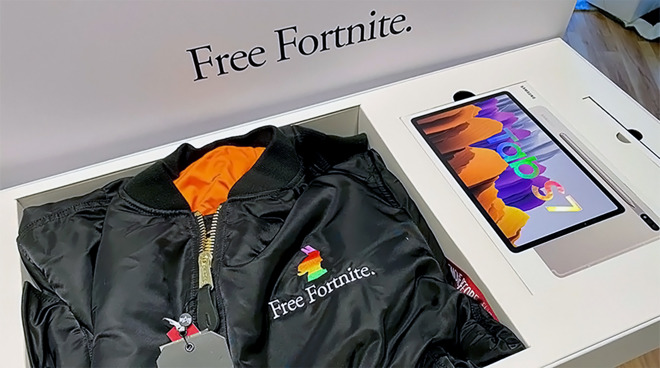
A 'Free Fortnite' care package sent to influencers.
Cook to undertake seven-hour deposition
Back in the United States, U.S. Magistrate Judge Thomas S. Hixson ruled on February 1, 2021, that Tim Cook must undergo a seven-hour deposition. At the same time, he denied an attempt by Apple to subpoena Samsung over how the game is distributed.
Hixson disagreed with Apple's argument against it and, in excusing Cook from the process, suggested the argument "limits the length of a deposition, rather than barring it altogether." Apple's compromise of four hours was deemed inadequate.
"In these three antitrust actions, the facts of the case go way beyond the historical facts of what happened when," the court concluded. "There is really no one like Apple's CEO who can testify about how Apple views competition in these various markets that are core to its business model."
On Apple's request to subpoena Samsung for internal documents, Hixson denied it by describing it as "almost quirky."
"Frustrating" Apple to hand over payment processing info
On February 2, 2021, Magistrate Judge Hixson ordered Apple to hand over payment processing documentation, using its "best efforts" to produce them. This was in response to previous requests that Apple argued would take time to produce due to the company's size.
"You're not really offering a solution to this problem," said Hixson to Apple's counsel, Jay Srinivasan of Gibson Dunn & Crutcher. "You're just saying No, we can't do it.' That feels frustrating and unsatisfactory to me."
Apple countered that it had already produced some 10 million documents during the discovery process versus Epic's 5 million. Furthermore, it claimed some of the information requested by Epic could have been produced as part of the existing document haul, and that Epic was still holding out on some information.
Epic goes to the Australian Competition and Consumer Commission
With a lawsuit in Australia not enough for Epic Games, the company took its Epic vs Apple legal dispute to the country's regulator on February 4, 2021. It told the ACCC that Apple's "unrestrained market power" is suppressing competition and innovation and is artificially raising the price of iPhone and iPad apps.
Epic said the forced "30% Apple Tax" accentuates the pricing, insisting the true commission should be closer to single digits.
"Apple's conduct is symptomatic of unrestrained market power that results in significant harm to Australian consumers and the competitive process. In the absence of these anti-competitive restraints, app developers would have a greater ability to distribute their apps, leading to increased competition and innovation to the benefit of Australian consumers," Epic's submission read.
Previously, Epic had praised the ACCC for investigating the App Store for alleged abuse of power.
Epic spent months planning App Store dispute
Epic's decision to introduce a payment processing option to Fortnite was premeditated, Epic Games CEO Tim Sweeney confirmed in a February 10, 2021, interview. Months were spent on a battle plan, beginning in August 2020.
The planning enabled Epic to prepare a 60-page lawsuit and a parody video in what was known internally as "Project Liberty."
"Epic's frustration with Apple especially, and Google to some extent, had been building up for at least three years," said Sweeney. "Ever since Fortnite grew to have a large audience, we felt stifled by several things."
Sweeney went on to claim that the effort was to encourage free markets and that the company was willing to invest heavily in an attempt to change the software industry. He did not reveal how much legal fees or lost sales the project has cost, but he admitted it cost "lots and lots" of senior leadership time.
Epic Games lobbyist-crafted App Store legislation rejected in North Dakota
A bill in North Dakota that would have forced Apple into allowing alternate payment mechanisms and app downloads outside the App Store was allegedly created with the assistance of Epic Games, it appears. On February 16, 2021, it was claimed draft legislation for Senate Bill No. 2333 was handed to lawmakers by a lobbyist hired by Epic Games.
Lobbyist Lacee Bjork Anderson, hired by Epic and the Coalition for App Fairness, was said to have provided North Dakota State Senator Kyle Davison with the draft legislation of the bill. It was equated as a way to "stop Apple and Google from forcing companies in the state to hand over a share of their app sales."
Later on the same day that Epic's alleged involvement leaked, the North Dakota State Senate rejected the measure.
The bill was seemingly crafted to hurt Apple the most if voted in and enforced. For example, it excluded game consoles from its impact, while the Google Play Store already allows alternate app marketplaces to exist.
While it failed in North Dakota, the fight over app store rules was far from over. The New York Times reported that lawmakers in Georgia and Arizona were considering nearly identical legislation. A state representative in Massachusetts said he was considering introducing a similar bill, and app store legislation was also being pushed in Wisconsin and Minnesota.
Epic Games files antitrust complaint against Apple in EU
After North Dakota rejected the anti-Apple bill, filed an antitrust complaint with the European Union against Apple, continuing the two companies' dispute over the App Store. Despite being in disagreement with both Apple and Google, Epic Games singled out Apple for the complaint, which the Fortnite developer says has eliminated competition.
"What's at stake here is the very future of mobile platforms," said Epic Games CEO Tim Sweeney in a company blog post about the complaint. "Consumers have the right to install apps from sources of their choosing, and developers have the right to compete in a fair marketplace."
"We will not stand idly by and allow Apple to use its platform dominance to control what should be a level digital playing field," Sweeney continued. "It's bad for consumers, who are paying inflated prices due to the complete lack of competition among stores and in-app payment processing. And it's bad for developers, whose very livelihoods often hinge on Apple's complete discretion as to who to allow on the iOS platform, and on which terms."
The blog post said the company "has faced and been harmed by Apple's anti-competitive restrictions." It stated that Apple's removing Fortnite from the App Store was retaliation for Epic Games giving users a way to pay the developer directly.
Epic did not mention Google in the blog post or the E.U. complaint, despite Google re



Comments
the mess they’ve created. Let them crying and shouting outside the AppStore.
The shoplifting analogy that Apple uses isn't very good. It is more like Epic setting up shop and selling things inside an Apple Store without paying any rent; Epic cries in the store that they made the products they are selling not Apple, so Apple should let them stay there for free.
Also I didn’t buy my iPhone to play fortnite as I’m sure many other people didn’t either so again people have a choice which platform they use if they really wanted to play fortnite so if there are other cheaper options out there, why doesn’t epic push their users towards that platform which apparently doesn’t charge a 30% fee.
At the end of the day, epic are also allowed to price accordingly so if they were really about the consumer then why not lower your own in app purchase prices. There are loads of developers out there selling content for up to £($)99 but it’s up to the end user to decide whether to pay these extortionate prices for “just a bit of extra programming”. Why don’t we all start complaining about those prices? Because it’s a free choice
Doesn't exist.
Even during the heyday of all the Samsung and Apple lawsuits, they still did business together while waiting for the courts to decide on their disputes.
Judge Rogers even suggested to Epic to put a compliant Fortnite back in The App Store until the trial, and depending on the outcome they could be compensated later.
Epic really screwed up.
Sweeney! Making a childish version of PUBG and selling character skins to pre-teens isn't innovation.
"the savings could be passed on to all our consumers and players would get a better deal on items, and you'd have economic competition."
Yeah, could be, but wouldn't. Simple.
Given what's going on with TikTok and WeChat, it seems relevant to ask.
Some developers did do direct sales, but that meant they had to do, and pay for, the distribution, delivery, marketing, and financial transactions themselves. I know some people who did it with shareware and the like. The difference in cost (and profit) of their shareware version, and the boxed version put together for them by a distributor was substantial.
With the App Store, Apple was offering to do all of that for them in return for a mere 30% as opposed to most publishing companies taking ~80%. The App Store was a way that developers could bypass publishers, resulting in lower costs, and, theoretically, higher profits for development.
Now, what Epic is doing, is working as a publisher and distributor. True, they have developed their own games, but they also sell games from other developers. How much does Rockstar pay them for sales of GTA or Red Dead Redemption through the Epic Games Store? (Serious question, I'd like to know.) We know how much they have to pay Sony and MS for access to the Playstation and XBox marketplaces (30% - what a coincidence), but they're not complaining about that.
It's really hard to see how any of this has to do with stifling innovation, rather than impacting Epic's profit margin.
Apple “could” renegotiate the agreement with Epic to match Epic’s own agreement of 12% for exclusivity of Fortnite and compel them to remove it from every other online store. Let’s see how Epic reacts to that.
It’s also Apple policy to remove ALL accounts from a company based simply on the fact that if someone like Epic “cheats” under one account they are also likely to “cheat” under another account. For example, Epic could slip a payment system into Unreal Engine.
My prediction is Epic loses again on Fortnite and it remains blocked from The App Store unless Epic returns it to its original non-infringing state.
I also predict Epic loses on the Unreal Engine developer accounts, and Apple will be able to remove them after a period of time (maybe 14 days). I also think the judge will state that if Epic modifies Fortnite to comply that Apple will let it back in and their Unreal Engine Dev accounts would be safe.
I see no difference in what Apple does with the App Store and what every other commercial landlord has been doing forever. Epic knows full well that they will make more money within the App Store than having their own store outside it. They want their cake and to eat it too.